Photographs: Vaihayasi Pande Daniel/Rediffcom
Mirwaiz Umar Farooq discusses the difference between peace and normalcy and his vision for Kashmir, in an interview with Vaihayasi Pande Daniel.
Part II : Mirwaiz: 'Potential threat to peace is not Afghanistan, it's Kashmir'
At his residence, behind high walls and top-notch security, close to the pretty Nagin Lake and a short distance from central Srinagar, some of his flock awaits him -- large families with apple-cheeked babies, petitioners, and the devoted. The Mirwaiz, as he is simply and respectfully called, by most Kashmiris, is the 14th “head preacher” of Kashmir’s four million Muslims and belongs to a line of chief priests going back to the 11th century.
Mirwaiz (Dr) Moulvi Mohammed Umar Farooq, who graduated from Srinagar’s venerated Burn Hall School and had plans to become a software engineer, suddenly took on the priestly mantle at 17, when his father, a moderate Kashmiri leader, was assassinated by Hizbul Mujahideen gunmen in 1990 at his home in Srinagar.
The present Mirwaiz, who did his PhD in Islamic studies from Kashmir University, brought together the innumerable pro-Pakistan Occupied Kashmir and pro-Pakistan organisations of the state to form the unified All Parties Hurriyat Conference, of which he is the chairman. Hurriyat means liberty in Kashmiri. His mission is to create special awareness globally for Kashmir’s issues.
We sit in his drawing room, lined with books and walnut furniture. A large model of the Srinagar’s 15th century Jamia Masjid sits on a side table. He juggles two cell phones as he speaks.
Dubbed over and over again as the “moderate and pragmatic” voice from the Valley, Mirwaiz Umar is approachable, and speaks thoughtfully and bluntly about issues that concern his homeland. Equally critical of Pakistani militants and security forces, he has maintained that he is looking for a solution that gives dignity to the Kashmiri.
This is the first of a two-part interview the Mirwaiz conducted with Vaihayasi Pande Daniel at Srinagar earlier in September and later over the telephone from Mumbai.
What do you feel about being detained in connection with this present situation in Shopian, south Kashmir?
This is nothing new.
The problem is that on one hand the Government of India says we have to deal with Kashmir politically. But they act only militarily. The voices of dissent are always put under strong curbs. We are not even allowed to mourn the dead.
The fact remains that when the (conductor) Zubin Mehta show happened, the media – whether print or electronic – they tried to give the impression that all those four people that got killed (on September 7) were militants. The fact remains that none of them was a militant. They are all civilians. We have the right to be with those people.
For the last ten days – today is the 11th day – continuously Shopian is under curfew and people have food shortages, they don’t have medicine, they don’t have milk.
This is now becoming a trend with the government, that whenever they feel there is problem on the streets, or it can turn into an embarrassing situation for the government, they impose curfew, right, left and centre.
That has been the policy, whether it was the hanging of Afzal Guru (hanged for the 2001 attack on Parliament), whether it was the 2008, 2009, 2010 agitation or whether when we saw the killings in Gool (in Ramban when four people were killed in July) or today we saw the killings in Shopian.
They just confine you to your houses. There is no legal sanctity to the process. They put an army truck outside your house, they have police and armed personnel and there is no legal authority that they have. They don’t give us a notice. They don’t give us any legal document… They just barricade your house and don’t allow you to move out.
So this is a basic infringement in our civil rights. Who do we tell?
As I said, Kashmir has been virtually turned into a police State. And the chief minister and the opposition are probably as helpless as the Hurriyat is.
Did you expect to be detained?
I was not expecting (it). We haven’t given (information about) any such programme where we have told the people that they should come out in the street and agitate.
We had just announced that the Hurriyat leadership is going to Shopian and meet the people there. They are forcing us now.
Today the Hurriyat is meeting. But I am not allowed to go to the meeting. I have been confined to my house. But still I will be speaking to the meeting over the phone or Skype or whatever.
Now we have decided that we will be going to Shopian on Friday. I will offer my Friday prayers at the Shopian Jamia mosque to show solidarity with the people in Shopian who have been under curfew for the last 10 to12 days.
Is the local government responsible for the situation?
The local government, as such, has lost all its credibility.
When you have the chief minister (Omar Abdullah) who is breaking down in the assembly and saying I cannot do anything, the Armed Forces Special Powers Act repealing is not in my authority, you have a helpless opposition, you have all the MLAs, so I think the government has lost its credibility.
Yesterday, the people in Shopian did not meet the government officials, they boycotted them. The government is losing credibility day by day when they call themselves elected representatives of the people. The people get massacred. They have no answer.
Unless all these black laws are repealed – AFSPA (Armed Forces Special Powers Act), this public safety act, disturbed areas act -- unless they are done away with, you cannot have a situation where civil rights and civil liberties are guaranteed to the people.
In situations like this, what we can only do is keep on agitating in a peaceful manner. House arrests and detentions are becoming a part of our daily life. This year I have been kept in house arrest may be more than 30-35 times.
Will the police/security forces prevent you from going to Shopian on Friday?
I don’t know. Because we haven’t yet told the people to come, we had said that the Hurriyat leadership wants to go and we want to go.
But I think if they continue with detentions and house arrests we will ask the people to march with us.
It will definitely create a problem. We don’t want that. But we are left with no other option.
We are concerned about the people in Shopian. They have been left at the mercy of the security forces in that area. For the past 10 days we have been receiving calls, receiving messages from the local population, from the local civil liberty groups, from the local imams that we have a shortage of food and we are not being allowed to move out of our houses.
Please ...
'There is a difference between normalcy and peace'
Image: The Mirwaiz believes the Kashmir struggle has become non-violentPhotographs: Vaihayasi Pande Daniel
Is the announcement by Al Qaeda leader Ayman al-Zawahri, who is believed to be hiding in Pakistan, endorsing jihad in Kashmir worrying?
I think we have made it absolutely clear that Kashmir is an indigenous movement. We want to keep it that way.
I don’t think the Kashmir movement has anything to do with the Al Qaeda or Taliban.
Time and again it has been proved that it is an indigenous movement. Yes, people are dying, militancy is still there. Yesterday two more locals boys have been killed in north Kashmir, in Pattan area (near Baramulla), both of them are Kashmiris, both of them educated.
Definitely we want to keep the movement peaceful. We don’t want the movement to be violent. But if violence is thrust upon the people and there is no via media, there is no outlet for us to project our own point of view, it will definitely give birth to more and more radicalisation, at the youth level, at the movement level.
I believe that the government of India is directly responsible for that.
Before coming to Srinagar I read in the news about how Kashmir is regaining ‘normalcy’. Who do you credit for the observably better situation in Kashmir?
I think, there is a difference between normalcy and peace. First of all we have to understand that.
You cannot expect a society to be in a continuous state of war for a long time. People tend to adapt to situations very quickly and I think 20 years has been a long time.
If you ask here about militant-related incidents, violence, it has definitely gone down. No doubt about it. We have seen militant-related activity coming down, in a big way.
That does not mean that the situation is okay. On one hand if militancy has gone down, on the other hand the number of troops in Kashmir has not gone down. The number still remains the same as it was during the peak of militancy.
The second aspect: More or less, the voices of the Opposition have been completely silenced. Opposition voices are not being allowed to go out, have rallies, have programmes. There is a blanket ban on all activity that is related to propagating a point of view which is probably not accepted by the Government of India.
The third aspect: Definitely there has been a huge crackdown on young men, on youths, on students, on people who are a part of this issue
So I think it is a relative term -- how you see normalcy.
Interview with the Mirwaiz in 1997: 'The people are desperate. They need a solution fast'
For us normalcy would mean (having) people’s civil rights, civil liberties, their other rights are restored. And there is an element of real peace in our lives which is definitely missing, as far as a common Kashmiri is concerned.
We have to understand that people here are still in a state of turmoil. If you look at it, we have issues like missing persons, numbering around 9,000. We have 6,000 graves which have been found. It is still a very active issue.
Then of course we have the India-Pakistan issue also. Right now at the LOC (Line of Control between India and Pakistan), we are seeing that two countries and two armies are eyeball to eyeball with each other.
So again the situation (may appear to be) in a state of calm. But one incident can, anywhere, spark the ignition we saw in 2008, in 2010, when there was a people’s peaceful resistance struggle that went on.
But yes definitely there is a transformation. There is a transformation from a violent struggle to a non-violent struggle. I believe a majority of Kashmir youth now realise it is important and much more acceptable in today’s world that if you have issues you protest peacefully. You express your views in a peaceful manner.
Please ...
'The Kashmir struggle has reached a place where it has to be peaceful'
Image: Security forces shut down central Srinagar for the Zubin Mehta concert September 7Photographs: Vaihayasi Pande Daniel
With America pulling its forces out of Afghanistan next year, there is anticipation that things could get worse in Kashmir. What needs to be done to combat this?
There is a lot of talk that peace in Afghanistan is linked very much with peace in South Asia. Things could turn ugly if India and Pakistan are not in a position to come closer to each other. If the US troops move out of Afghanistan you might have a spill over effect in Kashmir...
That is there. I believe many players are banking on that.
But as far as the Hurriyat is concerned, we always have maintained that this is a political problem. This problem cannot have a military solution, that is why even at the LOC… at my Friday sermon (at Srinagar's Jamia Mosque), we welcomed the proposed meeting between (Pakistan prime minister) Nawaz Sharif and (Prime Minister) Manmohan Singh at the end of the month. It is an opportunity for them to make a new beginning.
Many people want, many agencies want to somehow restart the violent circle, which we don’t want. Unfortunately what will happen and what we are seeing is that there are elements in both the countries who want to push this bogey of confrontation. They don’t want some sort of resolution.
Hurriyat, for its part -- we had recently written a letter to both the prime ministers -- has expressed its support. If there is a sincere and serious effort to move forward, and look at the problems and the issues, because the fact is that Kashmir is the underlying issue.
You have Sir Creek (dispute over a strip of water in the Rann of Kutch between India and Pakistan), you might have water, you might have Siachen (Glacier), but the confrontation has always been on Kashmir. So I think there is a need to look at this problem from a political angle, as well from a human angle.
First of all it is a human issue. People are divided. Families are divided. An unnatural situation. It is important that India and Pakistan should seek a new beginning. They should look at it from a new perspective and try to build a consensus.
But I would like to make this point: We don’t have to address the Kashmir issue because Afghanistan is a problem. I think Kashmir in itself is a huge problem. Sixty-six years have gone by, since 1947, this problem has remained. So Afghanistan is there, yes, and if Afghanistan is solved and if there is a peaceful resolution to the problem there, it will have a good effect. But just to say that because Afghanistan is important that’s why India and Pakistan need to address the Kashmir issue. We have our own problem. We have Kashmir (as a) separate issue and we can’t link it with Afghanistan all the time or with American or interests of the international community, as far as Afghanistan is concerned.
But at the ground level, because the US is withdrawing from Afghanistan, if the danger begins to increase, what do you feel needs to be done?
I believe that there has been a gradual decline in militancy. Yes, you might find odd incidents happening. Maybe once a month or twice a month. But I think that is not an indication that it is going a militant way. I still believe the Kashmir struggle has reached a place where it has to be peaceful. It has to be non-violent. And that is what will give it strength.
We saw the outcome of 2008, 2009, 2010. Although, unfortunately, nothing moved forward, at least, people realised that Kashmir is a problem.
For the first time we saw that the Indian public also reacted to the situation. Otherwise they have been made to believe that whatever is happening in Kashmir is a creation of Pakistan -- Pakistan is doing this, Pakistan is doing that. It is important for them also to know that there is a genuine issue in Kashmir. There is a genuine problem that people have.
And they have to de-link Kashmir from administration. The Kashmir problem is not of bad administration. One government will go and another will come. It is not about elections. That free and fair elections are held and that is enough. For most of the Indians, that is how they perceive Kashmir. That is not the case.
So I think it is important for the Indian public… and they did realise in 2008-2010 we saw, for the first time, in the media, the public, the civil society, they did raise their concerns when they saw that innocents were being killed on the streets of Srinagar by the police side. At that time killings were only happening on the government side. They were ones who were shooting people down and killing young men who were with stones and protesting on the streets. This movement has to be kept peaceful.
I personally don’t see a revival of militancy in Kashmir, unless of course some dramatic changes happen across Pakistan and Afghanistan, maybe in a huge way.
I believe that the Hurriyat Conference wants to keep this movement peaceful and to take the movement peacefully towards a logical conclusion.
Please ...
'You can't only talk about azaadi in a vacuum'
Image: The Mirwaiz blesses a young Kashmiri girl at his residencePhotographs: Vaihayasi Pande Daniel
I have been here two days. This is my first trip to Kashmir. I have been talking to people, wherever I have travelled. I ask them about you and their perception of you. Their reactions are a mixed bag. They respect you, because of who you are. But they feel let down maybe because you talk more about economic solutions. How do you address this perception? They revere you, but feel you are not speaking up for them as much you should.
When we talk about a political solution to the Kashmir problem, it has to be inclusive of all the issues we are facing.
But over time we have issues that have developed which we need to address. We cannot deny the fact that there is a huge problem, primarily after 1947 when we saw distributions of the waters of Kashmir (India is the upper riparian of the Indus River and its tributaries and the Partition ushered in sharing arrangements between the two countries). India and Pakistan signed agreements. Kashmiris were the ones who were most deprived of their resources. So we feel there is exploitation of resources.
It is important we talk about the economy. Yesterday in my sermon I said about the fact that our agricultural economy is dying. In 1947 we were self-sufficient. To support our state. But today we are importing 70 per cent and only producing 30 per cent. Our agricultural lands are being transferred into residential colonies and commercial colonies and so it going to have a long term impact.
So when you talk about azaadi (freedom from India) you can’t only talk about azaadi in a vacuum. You talk about a solution. You talk about a process. You talk about a situation where tomorrow you have economic freedom as well as political freedom. In today’s world, in today’s geo-political environment, in fact, I would say geo-economic environment, political freedom is useless without economic freedom.
People would -- obviously the youth with their zeal -- they want us to only talk about the political problem and keep on bashing India.
But that is not going to help.
It is important for us to understand that if there is a policy we have to understand its design. We feel that over the years Kashmiris have been made dependent. We need to get out of this.
If tomorrow if we are asking for independence, we should have the resources, we should have the capacity to stand on our own feet.
That is somehow missing. So we have to prepare the people for that also. For example, I remember when we were in the Hurriyat, together, me, (Syed Ali Shah) Geelani Sahib and others… When we used to talk about these issues – issues like electricity, issues like healthcare, issues like roads, or economics, so many people, like Geelani Sahib (who heads one faction of the Hurriyat), would say it’s a diversion. We shouldn’t be talking about these things.
I think it is important. It is part of today’s world and if we need have vision of Kashmir maybe 10 years or 20 years down the line. We should have an understanding of what we need and where we are standing.
Please ...
'The Government of India wants to control everything in Kashmir'
Image: Security forces seal the waterfront along Dal Lake September 7Photographs: Vaihayasi Pande Daniel
What about employment issues (according to an estimate, there are 650,000 unemployed youth in J &K)? How will more employment, in your view, come to Kashmir?
Unless we have the private sector coming in -- and that is not coming in unless they see some sort of resolution, some sort of permanent peace in the valley.
We saw in 2008-10 most of whatever small (number) of multinationals we had, went off. I remember Airtel (phone company)was here, Tata was here. They saw it is a very dangerous situation and their businesses are suffering.
It is not like the government. They can carry on with losses for years. So they took out their money.
It is important that the private sector comes. We have to get investment at different levels. But for that also we need to have proper approach.
The problem is, for example, I remember in the early 1990s, the World Bank wanted to invest here. The EU (European Union) was ready to help. But then there were some issues with the Government of India. The Government of India was not really keen that they should come directly and invest in Kashmir. They wanted them to come through India. That is also one of the issues.
There are organisations, institutions and countries who are willing to come here, in support… I remember during the (2005) earthquake, which happened on both sides of Kashmir, the most damage was done on the other side, you know the OIC (Organisation of Islamic Conference) wanted to come, the Turkish government wanted to come. India did not allow them to come. They said it is an integral part and we will manage on our own.
There are also issues with the government's thinking. They need to come out of this -- they want to control everything in Kashmir.
For example, this LOC bus (between Srinagar and Muzaffarabad, in Pakistan-Occupied Kashmir and Poonch and Rawalkote, Pakistan) which was there for the people of Kashmir. Whenever something happens between India and Pakistan, the first casualty is the bus, the first casualty is the across-LoC train (Samjhauta Express between Attari and Lahore), as we saw in Poonch (on the LOC) recently. So it should be de-linked with whatever (issues) India and Pakistan are (facing).
Don't miss Part II of the interview with the Mirwaiz: 'If we talk about ecology we are labeled as separatists, we are labeled as intolerant people'
TOP photo features you missed last week
...

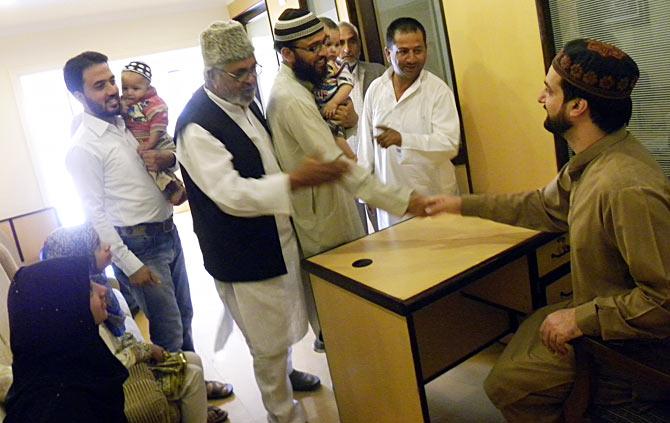
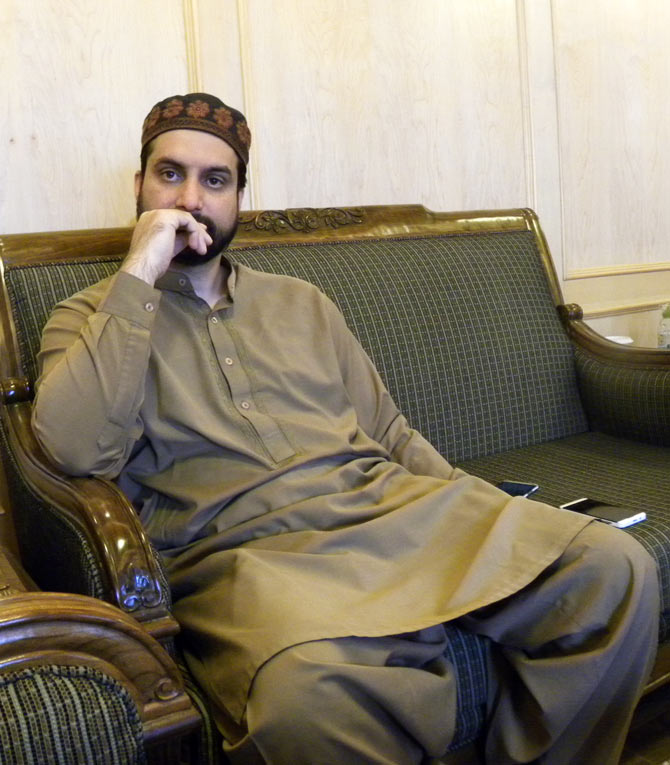
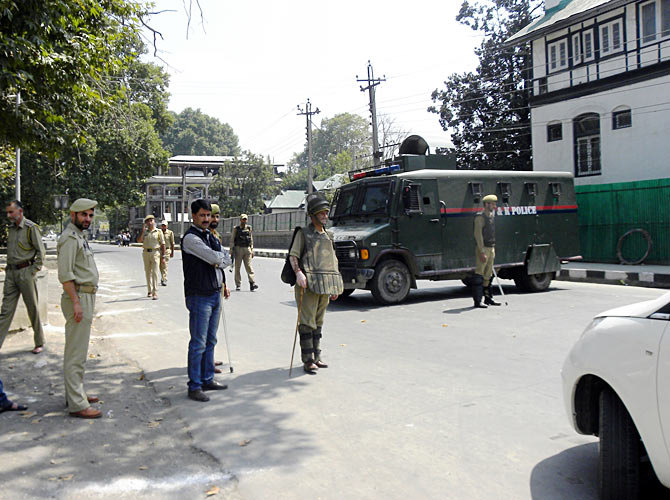
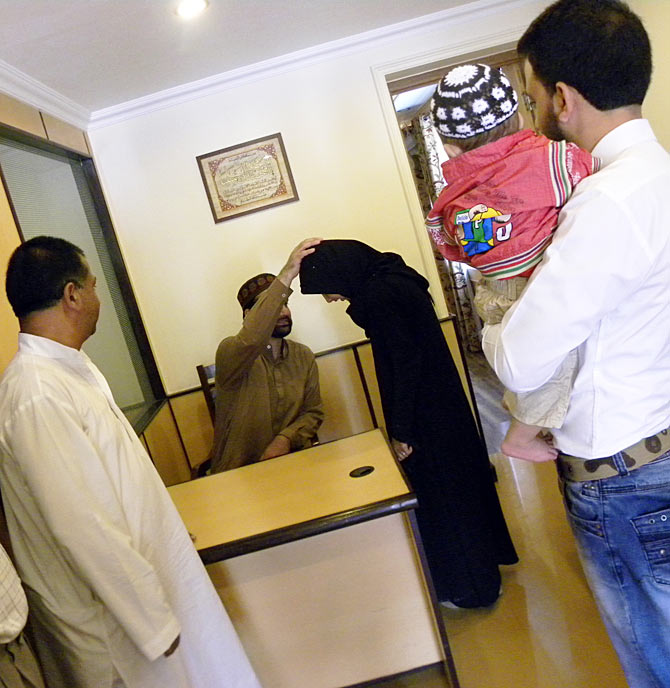
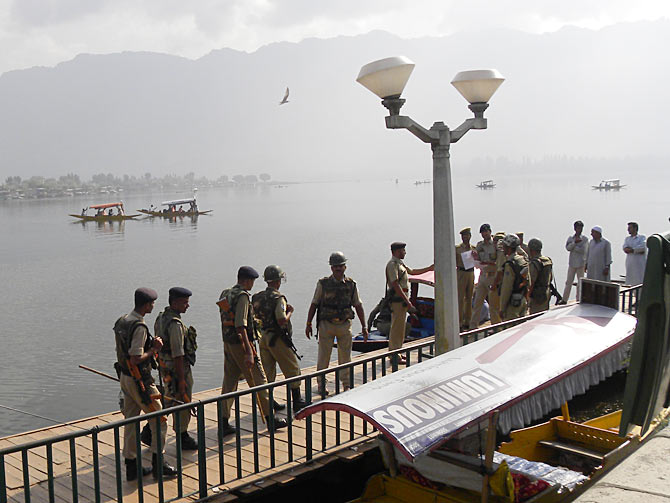
article